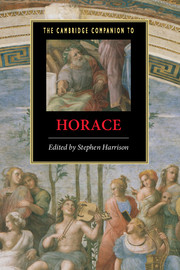Book contents
- Frontmatter
- Introduction
- Part 1: Orientations
- Part 2: Poetic Genres
- Part 3: Poetic Themes
- 12 Philosophy and ethics
- 13 Gods and religion
- 14 Friendship, patronage and Horatian sociopoetics
- 15 Wine and the symposium
- 16 Erotics and gender
- 17 Town and country
- 18 Poetics and literary criticism
- 19 Style and poetic texture
- Part 4: Receptions
- Dateline of works and major political events
- Works cited
- Index
18 - Poetics and literary criticism
from Part 3: - Poetic Themes
Published online by Cambridge University Press: 28 May 2007
- Frontmatter
- Introduction
- Part 1: Orientations
- Part 2: Poetic Genres
- Part 3: Poetic Themes
- 12 Philosophy and ethics
- 13 Gods and religion
- 14 Friendship, patronage and Horatian sociopoetics
- 15 Wine and the symposium
- 16 Erotics and gender
- 17 Town and country
- 18 Poetics and literary criticism
- 19 Style and poetic texture
- Part 4: Receptions
- Dateline of works and major political events
- Works cited
- Index
Summary
Study of Horace as a critic of literature normally and justifiably focuses on the Ars Poetica and on the two 'literary' epistles of Book 2, to Augustus and Florus; sometimes the three poems in which Horace discusses the satiric genre are also brought into the picture (Satires 1.4, 1.10, 2.1). But the poet’s comments on other writers and on literature in general are not confined to these works; nor is the subject-matter of those poems restricted to literature. In this chapter I try to present a broader view, and consider a number of recurring preoccupations which can be traced in Horace’s writings from first to last.
We need be in no doubt that Horace was familiar with the terminology and conceptual framework of ancient literary criticism. He described himself as learning the perils of anger from studying the Iliad at Rome (that is, in his schooldays: Epistles 2.2.41-2); elsewhere he shows full awareness of the moralising readings of both Homer’s poems (Epistles 1.2). His splendid characterisation of Pindar runs through several of the categories into which that poet’s work was divided in the Alexandrian edition. He aspires to join the ranks of the lyric bards (alluding to the 'canon' of Greek lyrici established by Hellenistic editors); he draws on Aristotle’s Rhetoric for his characterisation of the different age-types, and also uses ideas derived (perhaps at some remove) from the Poetics; he alludes to Aristarchus as the model of the judicious critic.
- Type
- Chapter
- Information
- The Cambridge Companion to Horace , pp. 248 - 261Publisher: Cambridge University PressPrint publication year: 2007
- 2
- Cited by



